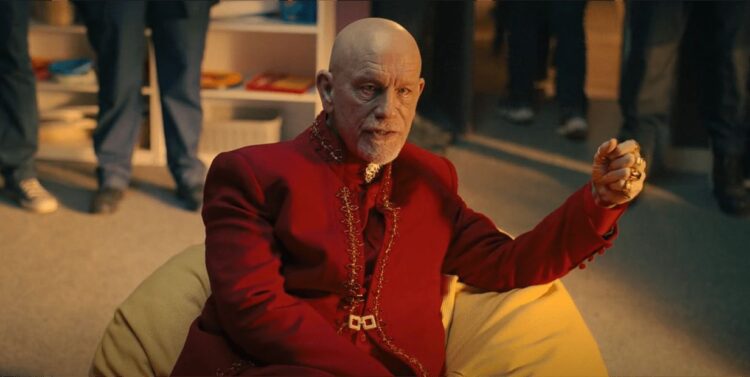Ariel Ecton, the main character in A24’s “Opus,” finds herself in a difficult situation at the conclusion of the film. When it becomes evident that the antagonist has much more in store, her hard-won victory is exposed as a façade. The main focus of the film is pop sensation Alfred Moretti’s long-awaited comeback and how his exclusive listening party quickly turns into a cult. Beginning at the top, Ariel finds it difficult to understand the cult members, known as Levelists, and their intentions. But in the end, the enigmatic pop star divulges more than the journalist had anticipated, forcing her to flee for her life. BEWARE OF SPOILERS.+
Opus Plot Synopsis
The narrative follows Ariel Ecton, who is trying to find success as both a journalist and a novelist. Her friend suggests that her lack of remarkable experiences might be holding her back. However, things take a turn when pop star Alfred Moretti announces the release of a new album after almost thirty years, sparking a media frenzy. As part of his tradition, he invites a select few for a private listening party, and Ariel is surprised to find herself among the six invitees. Alongside her is her boss Stan, talk show host Clara, influencer Emily, paparazzi Bianca, and radio host Bill.

Upon arriving in Green River, Utah, Ariel starts noticing unsettling signs. The group’s phones are confiscated, and they are taken to a secluded compound where everyone wears blue. When Moretti arrives, Ariel discovers he leads a cult called the Level. As she investigates further, she uncovers their true agenda: a world driven by creativity. Tragedy strikes when Bill is found dead after a massage, and the incident is quickly hushed up. The next day, the cult’s odd practices continue, including a request for Ariel to shave all her body hair and have a concierge with her at all times. They attend Moretti’s listening party, but it is cut short when Emily has a coughing fit.
The following day, Emily disappears, and Ariel insists on leaving but is persuaded to stay for a puppet show. The performance, which addresses the media harassment faced by singer Billie Holiday, raises alarms. In a shocking twist, it is revealed that Emily has been poisoned and hidden inside the bean bag Ariel is sitting on. This discovery leads to chaos, with cult members restraining the guests as Moretti unveils his plan to kill them all. During a nighttime ceremony, a cult member named Julia helps Ariel escape. She manages to evade the compound’s boundaries, steals a fan’s car, and speeds away to safety. Although Moretti is captured and imprisoned, their conflict is far from resolved.
Opus Ending: Is the TV Show Host a Levelist?
The concluding scene of ‘Opus’ heightens the story’s irony. Ariel is invited to a talk show during her peak success, but something feels off. Before the host starts her usual questions, she points out that Ariel’s book about her traumatic past, titled ‘Our Time in the Sand’, has polarized opinions on Moretti and his cult. As Ariel observes more closely, she spots that the host is wearing a uniquely designed pearl necklace. She quickly realizes that the pearl comes from Moretti’s compound, indicating that the host is a Levelist. This final twist doesn’t aim to flip the narrative but rather emphasizes Ariel’s despair, reminding her that she is now part of the system she once opposed.

On her second day at the compound, Ariel learns the truth about the pearls. Moretti enthusiastically takes her to a special hut designed solely for shucking oysters to collect pearls. He refers to this process as “Diving,” elevating it beyond a mere task. According to him, this process represents a larger mechanism in the world, symbolizing the achievement of true balance. He compares oyster shells to humans, suggesting that only a few possess something extraordinary. He further argues that one pearl can balance out the many empty oysters, leading to a disturbing conclusion: that many must be sacrificed to create these so-called special individuals.

Moretti’s pearl necklaces can be seen as symbols for those he considers special. However, the true fate of his followers remains unclear. Initially, Ariel suspected that Moretti planned a mass-suicide by lacing their champagne with cyanide. Yet, when she returned with the police, the Levelists had seemingly vanished from the compound, leading her to think Moretti had killed them and hidden their bodies. However, during a conversation in prison, she discovers that the Levelists have simply gone back to their regular lives, engaging in various jobs. Even the more sympathetic members, like Julia, appear in a montage.
Thus, the TV show host seems to be one of Moretti’s many followers, who have spread globally. It’s unclear whether she is an original member or a new recruit in the latest cultural wave. Moretti tells Ariel that his followers are active, advancing in their fields while nurturing new talents and keeping an eye on those he views as obstacles. Consequently, Ariel finds herself caught between both sides. Although she is not a Levelist, she plays a significant role in enabling them, and her encounter with the host reinforces that connection. Whether or not she is confirmed as a cult member is less important than the unsettling possibility that she could be. Ultimately, Moretti’s ideology has deeply infiltrated society, leaving Ariel uncertain if her fears are valid or merely paranoia.
Why Does Moretti Commit The Murders?
When Ariel arrives with assistance, the Levelists have already vanished from the compound, but Moretti decides to stay behind. He stages a dramatic piano performance, attended by the five deceased guests from the listening party, whom he has brutally killed. His motivations for these murders are a mix of personal grievances and a broader philosophical agenda. Moretti explains how each guest wronged him: Bill criticized him for taxidermying his dog, Stan dismissed one of his songs as overrated, and Clara and Bianca took advantage of his insecurities about being bald.

Emily, a modern influencer, seems to have no direct connection to Moretti but disrupts his event with a coughing fit, which triggers his wrath and leads to her grim fate. Moretti’s actions draw parallels to Julius Caesar, a connection he deliberately makes since his album is titled “Caesar’s Request.” He is inspired by the story of pirates who kidnapped Caesar and demanded a ransom, viewing him as an ordinary man. Caesar, in turn, demanded a higher ransom to assert his status and later returned with an army to exact revenge. Moretti likely sees himself as a misunderstood figure disrespected by critics, and his return to the music scene and subsequent killings reflect this mythological narrative.

Moretti believes that his victims represent the flaws of past ideologies. He argues that contemporary society values superficial intelligence over genuine achievements that could benefit others. He criticizes a civilization that he feels is overly reliant on logical thinking, which he associates with the left side of the brain, contrasting it with the right side, linked to creativity and intuition. Moretti thinks these creative aspects could help humanity escape a cycle of violence. His decision to eliminate those he deems uncreative contributes to the reputation of the Levelists. However, Ariel quickly points out that Moretti’s underlying motives seem to stem from his personal vendettas, which appear to be the primary reason for his actions.
Why Does Moretti Spare Ariel?
Ariel’s survival from the cult’s sinister activities is both remarkable and intriguing within the story, ultimately leading to the release of her book. While she enjoys the fame that comes with it, she can’t shake the feeling of how she escaped the horrors unscathed and hasn’t been targeted since. Her concerns are confirmed when she encounters Moretti in prison, discovering that her escape was part of his larger scheme to utilize her abilities to share their stories widely. He intends to promote his philosophy of the Level on a global scale through her. When the protagonist argues that people will never support his actions, Moretti makes a comment about how sensational events tend to remain in public conversation, regardless of their disturbing nature.

At the core of ‘Opus’ are two artists navigating a complex power dynamic. Moretti, having achieved significant success, represents one end of the spectrum, while Ariel, a struggling artist criticized by her peers for lacking an engaging life story, represents the other. Her experiences in the compound provide her with the necessary inspiration, evident in the success of her book. The similarities between her work and the popstar’s “Caesar’s Request” are not coincidental, as both ultimately aim for the same goal: Balance, as advocated by Moretti. Even though Ariel manages to escape the compound, she remains bound by its influence, symbolized by the scars on her hand, which unintentionally resemble those of the Levelists.

When Ariel learns the truth about her survival, she is visibly shaken and asks why she was chosen for this role. The popstar explains that there are two reasons for this choice: one aligned with the Levelists’ interests and the other stemming from Moretti’s personal preference. He describes her as a “pure vessel,” untouched by the arrogance and bad faith prevalent in her industry. He also references an early article of hers where she describes a school board member’s chin as “delightfully inconspicuous.” More than just the content of her writing, it’s her honesty and bravery that attract Moretti to her, a choice that proves fruitful as her authenticity seems to resonate with his perspective even more than the popstar’s own.





















